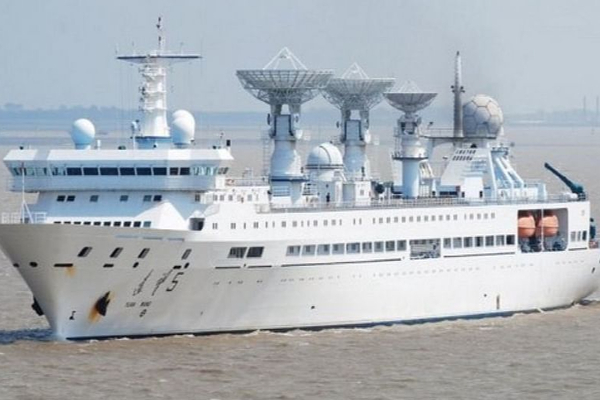The Sri Lankan government has taken a tactful decision to avoid a geopolitical, diplomatic crisis resulting from pressures, usually from India and, more recently, from the US and Japan, due to the arrival of Chinese research ships to Sri Lankan ports.
It has been decided to have a one-year moratorium in allowing foreign ships to conduct research in Sri Lankan waters.
Foreign Minister Ali Sabri told the media this week that the decision will come into effect from January 2024 and the government has notified it to the countries concerned and added that the moratorium was announced with the aim of doing some capacity development to facilitate Sri Lanka to participate as an equal partner in the exploration activities carried out by foreign vessels in our waters.
The government’s decision came in the wake of China’s request for permission for another of its research ships to arrive at the port of Colombo to carry out research in Sri Lankan waters in the next few months.
Despite India’s objections, the Chinese ship Shi Yan 6 arrived at Colombo port in the latter part of last October to conduct surveys along the western coast of Sri Lanka with the participation of the National Aquatic Resources Research and Development Agency (NARA ) and Ruhunu University.
It is worth noting that before not even two months have passed, China has requested permission for the arrival of a another ship. This time, China had sought permission not only from Sri Lanka but also from the Maldivian government for the ship Xiang Yang Hong 03 to carry out deep-sea exploration in the South Indian Ocean from January 5 to till late May. The ship, which is currently off the coast of Xiamen in the South China Sea, was scheduled to pass through the Strait of Malacca, subject to approval from both countries.
This request came from China when a pro-China government has come to power in Maldives recently. New president, Mohamed Muizzu, immediately after taking office last month, asked New Delhi to withdraw Indian troops from his country. He had promised his countrymen in the recent presidential election that he would send back Indian troops.
A review and refocus of outgoing president Ibrahim Mohamed Solih’s administration’s agreements with other countries, which have been deemed intrusive of Maldives’ independence and sovereignty, was a pledge by president Muizzu detailed in the ‘Week 14’ or first 100 days, manifesto.
Former President Ibrahim Solih’s government signed a Hydrography Agreement with India in June 2019. The new president has now announced his withdrawal from the agreement. In case of withdrawal from the agreement, six month notice must be given. According to the notification, the agreement is due to expire on June 4, 2024. If not the agreement is cancelled it would automatically extend for five years.
China has asked the government of Maldives to allow its research ship into Maldives amid the possibility of a diplomatic spat between New Delhi and Male. The important question is what decision the Maldives will take after the Sri Lankan government announced a one-year moratorium on granting permits to foreign research vessels.
India has already asked Sri Lanka and the Maldives not to allow the Chiang Yang Hong 03, saying that the research carried out by Chinese vessels in the Indian Ocean is aimed at future military operations. China has not responded yet to the Sri Lankan government’s decision.
New Delhi said that when the Yuan Wang 5 ship arrived at Hambantota port in August 2022, and the Shi Yang 6 ship arrived at Colombo port in October this year, they would pose a threat to India’s security because of their intelligence-gathering capabilities.
But China, which said its ships are engaged in oceanographic research and do not in any way pose a threat to the security of any country, has strongly expressed concern that it is wrong for third country’s concerns to influence its bilateral engagements with Sri Lanka.
Sri Lanka is actually forced to adopt an approach that does not embarrass either India or China in the simmering disputes over the visits of Chinese research ships. The government said that during the days when the previous two Chinese ships were docked in Sri Lankan ports, they stipulated that no research activity could be carried out in Sri Lankan waters without the presence of NARA. But what is the guarantee that the Chinese ships did not do any research respecting Sri Lanka’s conditions?
It is a complicated matter for Sri Lanka to allow a Chinese research vessel again within a very short period of time after Chinese survey vessels have already arrived in Sri Lankan ports despite Indian objections. The pressure that could have come from India might have been very severe this time.
The Sri Lankan government may have felt that China was putting pressure on it by frequently requesting permission for research vessels as the geopolitical rivalry between the superpowers intensified.
So Sri Lanka was forced to find a way out of these problems for the time being. The result was a one-year moratorium on the granting of permission to foreign research vessels.
Sri Lanka has so far not taken any decision that could make China uncomfortable just because India is giving pressure. But there is no doubt that Sri Lanka’s current decision will definitely cause great discomfort to China.
At the same time, Sri Lanka may have also understood the need not to antagonize any major country in dealing with issues of geopolitical importance as national elections are to be held next year.
Meanwhile, some international political observers who suspect that India’s concerns about its security in the face of the visits of Chinese ships to Sri Lankan ports are overblown say that China does not need to send surveillance ships to Sri Lanka to know where India has deployed its strategic weapons, and that China’s satellite technology has grown tremendously.
There is a widespread perception in the southern Sri Lanka that India is expecting Colombo’s actions to be in exchange for an emergency loan given last year when the island nation faced a worst economic crisis in its history.
Despite several instances in the past where Sri Lanka has not respected New Delhi’s concerns on geopolitical issues, India has often not been harsh with Sri Lanka. India needs to ensure that Sri Lanka does not surrender completely to China.
In any case, Sri Lanka will have to do a tightrope walk in the geopolitical competition between Asia’s two big powers. The rivalry for dominance in the Indian Ocean risks intensifying as China has now started calling the Indian Ocean as ‘China-Indian Ocean Region’ (CIOR).
Senior Indian journalist and a seasoned political analyst based in Colombo, P.K. Balachandran, wrote an article in this regard in News in Asia last week.
” In opposition to the traditional practice of using the term ‘ Indian Ocean ‘ for the stretching from the Bay of Bengal to Antarctica over 9,600 km on the North-South axis, and from Southern Africa to Australia over 7,600 km on the East-west axis, China has begun using the term ” China – Indian On Ocean Region.”
“The term “China – Indian Ocean Region” (CIOR) was used in many places in an official document relating to a recent international conference on the Blue Economy of the Indian Ocean Region (IOR).
” The conference, which was on ” Blue Economy to Build Together a Marine Community with a shared Future “, was held in Kunming, in the Yunnan Province of China, on December 7 and 8.
” According to a participant in the conference, the Chinese appeared to be against the identification of the Indian Ocean exclusively with India. Hence, the re – designation of IOR as ” China – Indian Ocean Region” ( CIOR ) so that China too has a place in it.
” Participants in the conference from the region appeared to endorse the Chinese view in this matter apparently because they too felt the identification of the ocean with India alone gave the Indians a sense of ownership of the ocean and contributed to New Delhi’s bid to dominate it “, Balachandran said.
It is ominous that there is a danger that Sri Lanka is facing a big problem as the Indian Ocean becomes a competitive Region for world powers. It is necessary for Sri Lanka to maintain a sensible foreign policy without being dragged in the dangerous geopolitical rivalry.




